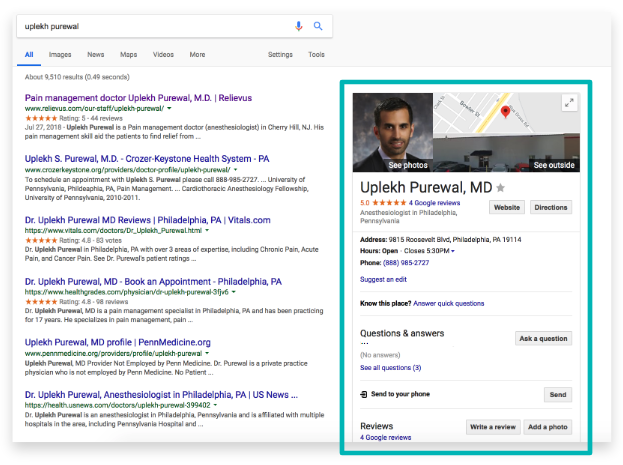Your website is less important than you think — here’s why
For years, your website was considered the “digital front door” to your practice. New consumer expectations for the digital age saw doctors purchasing their own unique URLs, hiring designers to create consumer-friendly, mobile-optimized websites, and implementing robust SEO strategies to get their practices in front of more prospective patients.
But things are different today. Your online presence has far outgrown your website. It spans the myriad healthcare directories, third-party consumer review sites, and social media platforms where patients seek objective, transparent feedback from others with firsthand knowledge of your practice. With more than 80% of patients reporting that they read provider reviews before deciding on a healthcare provider, a website alone won’t cut it anymore. Here’s why you need to think outside the site when it comes to your online marketing strategy.
Review sites dominate search results
Google has adjusted its algorithm to reflect consumer behavior. Not only does a healthy presence on third-party review sites help boost your own SEO and legitimize your business, but these sites get prime real estate on Google too. Whether a prospective patient is searching for a specialty or your name (or your practice’s name), the top results include Healthgrades, Vitals, and other external patient destinations. Doctors can take a few steps to improve their standing on these sites. First, ensure your listings information is accurate and consistent across the consumer web to get ranked hire (not to mention minimize patient frustration). Next, make sure you’re steadily growing a stockpile of high-quality reviews to give patients confidence in your practice.
>> Related read: Ace your online presence
It’s also noteworthy that the Google knowledge panel gets up to 10x the traffic your website does. On mobile, the Google knowledge panel will be the first thing patients see when they Google you or your practice. Make sure to follow the steps to claim your knowledge panel to optimize your presence for Google and get your practice in front of more eyes.

Patients trust online reviews as much as referrals from people they know
In 2016, online ratings surpassed word-of-mouth referrals for the very first time — a trend that hasn’t dipped in subsequent years. Today, most consumers visit at least two review sites before making a final decision.
Consider these statistics:
- 84% of patients consult online reviews before selecting a physician.
- 77% use online reviews as the very first step in finding a new doctor.
- 95% say online reviews are reliable (while 97% of the millennial demographic say the same).
Patients have been consumerized. They go where their search takes them. And that’s largely review sites where they can find objective, transparent feedback from peers. Website-centric strategies fail to address that a majority of patients will seek out information on trusted third-party sites before booking an appointment.
Word-of-mouth referrals are only a jumping-off point
Even if you have great word-of-mouth referrals, your online presence and reputation are more important than ever. A large majority of patients want to validate referrals from friends, family, and acquaintances with their own independent research. In fact, according to Doctor.com’s patient survey, 81% of patients will look up a provider online even after they’ve been referred. What’s more? 90% of them will choose another doctor who looks better online. To reduce referral leakage, it’s critical that any word-of-mouth recommendations coming your way are bolstered by a strong online presence and reputation across the consumer web.
You’ve probably already invested a lot of time, energy, and money in creating a compelling website that will appeal to patients. But as we like to say here at Doctor.com, a website alone is like a billboard in the desert: No matter how great it is, not enough people are going to see it, and it won’t cover all the important places your online presence exists. Today, a healthcare provider’s online presence encompasses the vast yet vital third-party sites patients are using to look for care as well as validation from their peers. In fact, 63% of patients have chosen one provider over another based on a strong online presence outside of the website. If you’re not proactively looking to take charge of that narrative, you’re missing out on new patients, and your practice will suffer.
Take the first step. Use Doctor.com’s practice diagnostic tool to scan your online presence and see how you compare to top doctors in your area.